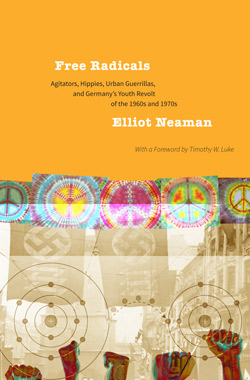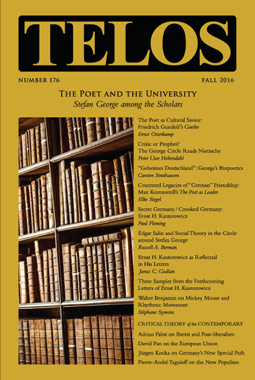By Telos Press · Tuesday, September 20, 2016 “He tried to imagine how he looked: a trembling bundle in a torn uniform, with a blackened, sweat-streaked face and staring eyes. . . . He stood and tried to calm his nerves through a series of curses. He thought he had talked himself back into heroism, when a new and even more terrible impact hurled him back into his hole. A second that followed immediately upon the first broke off a huge piece of the trench wall and almost buried him. He writhed free from the mass of earth and ran along the trench. No man could be seen at his post. Once he stumbled over a heap of debris under which lay a dead body. Somehow, a long, jagged board had penetrated his body; his eyes, glassy and bulging, stood out of their sockets.”
—Ernst Jünger, Sturm, describing the Battle of the Somme, whose centenary is this year.
Continue reading →
By Telos Press · Thursday, September 15, 2016 “If, in addition, one imagines not only that airplanes fly through the airspace over land and sea but also that radio waves from transmissions from all lands circle the globe uninterruptedly through the atmospheric space, then it would be easy to believe now not only that a new, third dimension has been achieved but also that even a third element has been added, the air, as a new elementary domain of human existence. To both the mythic beasts, Leviathan and Behemoth, a third would be added, a great bird. But we must not be overhasty with such consequential propositions. Indeed, if one thinks of the mechanized technical means and energies with which human power is exercised in airspace, and if one recognizes the explosive motors by means of which air machines are moved, then it appears that it is the fire that is the additional, genuinely new element of human activity.”
—Carl Schmitt, Land and Sea: A World-Historical Meditation
Continue reading →
By Telos Press · Wednesday, September 14, 2016 Coming on October 1st: Elliot Neaman’s Free Radicals: Agitators, Hippies, Urban Guerrillas and Germany’s Youth Revolt of the 1960s and 1970s. Pre-order your copy in our online store, and we will ship it once it is available. Save 20% on the list price by using the coupon code BOOKS20 during the checkout process.
Free Radicals
Agitators, Hippies, Urban Guerrillas, and Germany’s
Youth Revolt of the 1960s and 1970s
 by Elliot Neaman by Elliot Neaman
With a Foreword by Timothy W. Luke
Elliot Neaman’s Free Radicals presents a comprehensive panorama of the West German youth revolt in the 1960s, as well as its subsequent fragmentation and descent into terrorism in the 1970s. Neaman argues that the activists of the 1960s fundamentally misconstrued the nature of the young German republic, conflating it with earlier problematic German polities, and offered hazy world-shattering utopias to replace it based on artificial historical comparisons. The student radicals at first were swept along by liberalizing forces, but then made a decisive turn against reform in favor of an aggressive rejection of the existing order.
Continue reading →
By Telos Press · Tuesday, September 13, 2016 “Today words like ‘persevere’ and ‘hero’s death’ had been so ceaselessly bandied about that they had long since acquired an ironic sound—at least wherever there was actual fighting. . . . Once, before an attack, Sturm had heard an old sergeant say the following: ‘Kids, we’re going over there now to gobble up the Englishmen’s rations.’ It was the best battle address that he had ever heard. That was surely something good in the war—that it destroyed glorious-sounding phrases. Concepts that hung fleshless in the void were overcome by laughter.”
—Ernst Jünger, Sturm, describing the Battle of the Somme, whose centenary is this year.
Continue reading →
 One often speaks of the importance of poetry for thought, even of poetry as a mode of thinking, and perhaps nowhere more than in Germany, the country of Dichter and Denker, of poets and thinkers. The German intellectual tradition is defined by a long, intimately interwoven relation between poetry and thought going back to the solidification of the Modern Age in the eighteenth century: Klopstock’s “Republic of Letters”; Goethe and Schiller’s Classicism, especially Schiller’s “aesthetic state”; Hölderlin’s “founding poets” and the centrality of poets in “the time of need”; Jena Romanticism’s inextricable relation between “Symphilosophie” and “Sympoesie”; Hegel’s definition of beauty as “the sensible shining forth of the idea”; and onward to this day. One often speaks of the importance of poetry for thought, even of poetry as a mode of thinking, and perhaps nowhere more than in Germany, the country of Dichter and Denker, of poets and thinkers. The German intellectual tradition is defined by a long, intimately interwoven relation between poetry and thought going back to the solidification of the Modern Age in the eighteenth century: Klopstock’s “Republic of Letters”; Goethe and Schiller’s Classicism, especially Schiller’s “aesthetic state”; Hölderlin’s “founding poets” and the centrality of poets in “the time of need”; Jena Romanticism’s inextricable relation between “Symphilosophie” and “Sympoesie”; Hegel’s definition of beauty as “the sensible shining forth of the idea”; and onward to this day.
Continue reading →
By Telos Press · Thursday, September 8, 2016 “Every fundamental order is a spatial order. One speaks of the constitution of a country or a piece of earth as of its fundamental order, its Nomos. Now, the true, actual fundamental order touches in its essential core upon particular spatial boundaries and separations, upon particular quantities and a particular partition of the earth. At the beginning of every great epoch there stands a great land-appropriation. In particular, every significant alteration and every resituating of the image of the earth is bound up with world-political alterations and with a new division of the earth, with a new land-appropriation.”
—Carl Schmitt, Land and Sea: A World-Historical Meditation
Continue reading →
|
|




